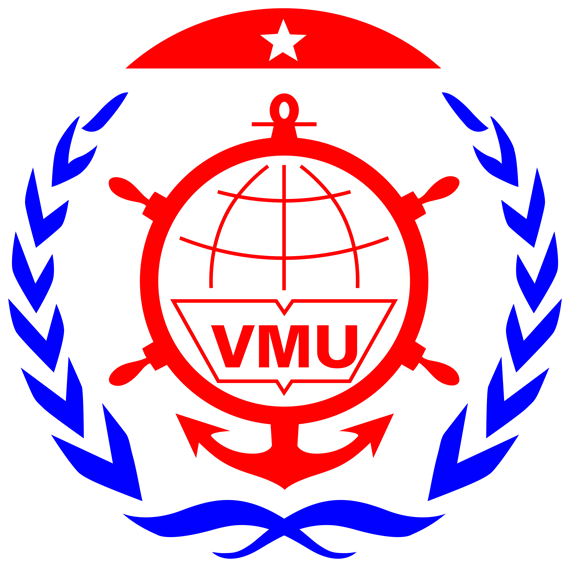1. Introduction
|
Program title: |
Bachelor of Business Law |
|
Graduation degree: |
Bachelor's degree |
|
Study model: |
Full-time |
|
Total credits: |
134 |
|
Used language: |
Vietnamese |
|
Training duration: |
4 years (8 semesters) |
|
Responsible Faculty: |
Faculty of Navigation |
|
Website: |
|
|
Address: |
Room 210, 2nd floor A2 Building, Vietnam Maritime University 484 Lach Tray - Le Chan - Hai Phong |
The Business Law training program is developed by the Faculty of Navigation and evaluated and issued by Vietnam Maritime University. The program is designed with reference to curricula from Toulouse University - France; the Financial University under the Government of the Russian Federation - Russia; Hanoi Law University, the School of Law - Vietnam National University, Hanoi; and Ho Chi Minh City University of Law, among others. The curriculum is regularly reviewed, updated, and revised to meet the practical needs of graduates while fully complying with the Ministry of Education and Training and Vietnam Maritime University regulations.
Students enrolled in the program are equipped not only with solid knowledge of the Vietnamese legal framework in general and the Vietnamese business law in particular but also trained in professional skills and attitudes in accordance with the Vietnamese Qualifications Framework, as well as various international requirements regarding 21st-century workforce competencies.
The Bachelor of Business Law program at Vietnam Maritime University offers a comprehensive education that prepares students for successful careers in the law as well as business sectors. With a focus on both theoretical knowledge and practical skills, graduates will be dynamic, creative, adaptable to various working environments, and competitive with human resources across the Asia-Pacific region. The program aims to contribute to economic development, national construction and defense, and international integration.
2. Curriculum
The Bachelor of Business Law program is organized into 8 semesters as follows:
Throughout 8 semesters, students undertake a comprehensive curriculum that combines theoretical and practical learning. In Semester I, students gain foundational knowledge through the General Theory of the State and Law and the History of State and Law, which develop scientific thinking and a proper understanding of all issues related to the law, and Microeconomics, which provides basic knowledge of economics in general and microeconomics in particular. Introduction to Law offers insights into the basic understanding of various specializations within the field of Law. The course Marxist-Leninist Philosophy equips students with a foundational philosophical mindset and a scientific worldview. Elective courses include MS Office Suite for software proficiency and General English 1 for language enhancement.
Semester II broadens students' knowledge with subjects like Vietnamese Constitutional Law, Vietnamese Administrative Law, Criminal Law, and Legal Culture to provide a foundational understanding of key legal fields in Vietnam. The course Political Economics of Marxism and Leninism provides knowledge about the current economic development policies of the Communist Party of Vietnam. General English 2, Environment and Environmental Protection, and Soft Skills 1 are elective courses that hone language and soft skills.
Semester III delves deeper into topics such as Scientific Socialism and Logic. Civil Law and Vietnamese Commercial Law offer basic knowledge of civil and commercial law, focusing on contract and enterprise law. Besides, General English 3 is one compulsory course for students to ensure that they achieve English proficiency equivalent to Level 2(A2) of the 6-level Foreign Language Proficiency Framework for Vietnam.
Semester IV explores advanced subjects like Legal Document Drafting, which enhances practical skills for law students in drafting legal documents; Criminal Procedure Law and Civil Procedure Law, which provide knowledge of procedures and case resolution in criminal and civil law; and Public International Law, which lays the foundation for principles and regulations of international law. Macroeconomics provides an understanding of government policies such as fiscal and monetary policy, and their impacts on the economy. The Ho Chi Minh’s Ideology course provides fundamental knowledge about the foundations, formation, and development of Ho Chi Minh’s thought. International Payment, Business Administration, and E-commerce Business Law are elective courses for students to broaden their knowledge in law and business sectors.
In Semester V, students study Labor Law, Environmental Protection Law, Legal English (English for Law), and Anti-Corruption Law to deepen their understanding of business law and other areas within the law major, while also improving their legal English proficiency. The History of Vietnamese Communist Party course provides fundamental knowledge about the founding of the Communist Party of Vietnam and its leadership role. Basic Internship is also a compulsory course for students this semester to immerse them in real-world challenges. Marriage and Family Law and Maritime Services Laware elective courses that enhance students' technical expertise.
Semester VI focuses on specialized topics like Banking Law, Land Law, Insurance Business Law, and Social Security Law that broaden knowledge of key legal sectors within business law in Vietnam. Moreover, ASEAN Community Law and International Trade Law provide specific knowledge on international and regional law as well as trade law. Business Exploitation Economics, International Trade Customs and Practices, and Innovative Entrepreneurship offer additional expertise and hands-on experience.
Semester VII emphasizes cutting-edge knowledge of business and economic law, such as Private International Law, Real Estate Business Law, Competition Law and Consumer Protection, Financial Law, and Intellectual Property Law. Law on Combating Illegal Wildlife Trafficking by Sea, Maritime Dispute Resolution, and Soft Skills 2 are elective courses.
In the final semester, students consolidate their learning through practical applications. The Graduation Internship immerses them in real-world challenges, and the Dissertation showcases their ability to integrate and apply knowledge from previous semesters. In addition, students may choose alternative graduation courses such as Dispute settlement in commercial business and Skills in negotiating and drafting contracts in commercial business.
